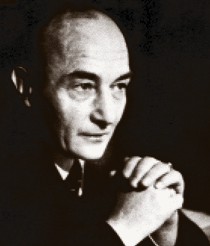Austrian writer Robert Musil’s first novel, Young Torless, was published in 1906, and from then until several years ago, he was underappreciated. Gradually, though, Musil’s been getting his due. With the recent publication by Knopf of the most complete version to date of his massive, unfinished, panoramic novel about Vienna on the eve of World War I, The Man Without Qualities, Musil threatens to become the most frequently discussed of all underrated authors, one whom everyone wants to take credit for discovering.
Certainly, Musil should be considered among the great fiction writers of our century, an author of great power and formidable intellect. The son of an engineering professor, Musil (1880-1942) delved into several fields before deciding to be an author. He went to military school as a teenager, then studied civil engineering and spent time in the army. Still uncertain about a career, he returned to school, getting a degree in philosophy in 1908.
Meanwhile, however, Young Torless, based on his experiences in the military academy, had been published and well received, and he decided to become a professional writer rather than an academic. He worked as an editor, critic and essayist but published few works of fiction. In addition to Young Torless and The Man Without Qualities, there is available, in English, Five Women, a superb and unfortunately overlooked volume of novellas, and a collection of short stories in the Eridanos anthology Posthumous Papers of a Living Author.
In some respects, the writing in Musil’s novellas is more ambitious than that in The Man Without Qualities. His themes in Five Women are not only love and eroticism, which he seeks to explore from a woman’s point of view, but also the life of the mind. A great deal of Five Women takes place inside his characters’ minds. Some of his more abstract work might be considered stream-of-consciousness writing, depending upon one’s definition of the term. Consider, in any event, this passage from the novella The Perfecting of a Love:
It’s possible that Musil was influenced by another Austrian writer, Arthur Schnitzler, who wrote one of the first stream-of-consciousness novels, Lt. Gustl, in 1901. Schnitzler, a physician, was also profoundly concerned with psychological states. The impressionistic, intensely poetic quality of Musil’s work, however, is not really characteristic of Schnitzler’s writing. Whether he was aware of them or not, Musil’s work shares a good deal in common with the French Symbolists.
Musil’s work had an expressionistic side as well. His imagery, metaphors and similes are often highly original, due, in part, to his knowledge of science and technology. Note, for example, on the opening page of The Man Without Qualities:
The protagonist of The Man Without Qualities, Ulrich, is in his early 30s, an engineer from a well-to-do family. Unmarried, physically attractive, socially prominent, he draws the attention of a variety of desirable women; he’s had a string of mistresses. He possesses a keen intellect, however, which leads him to alternate truth-seeking and pleasure-seeking.
Musil, like Theodore Dreiser, uses his gigantic novel as a vehicle to express all manner of opinions and observations, philosophical, psychological and political, and to paint a portrait of the Hapsburg empire on the brink of destruction. Vienna was one the great artistic and intellectual centers in modern history, and Musil is certainly aware of its impressive characteristics and citizenry.
The work has a huge cast of characters and a number of themes. Among them is the Collateral Campaign, meant to celebrate the 70th year of the reign of Hapsburg emperor Franz Josef, a project in which Ulrich becomes involved.
Another theme involves a psychotic murderer of prostitutes, Moosbrugger, who sits in his cell awaiting a verdict for his crimes–will he be executed or imprisoned in an asylum? His case has caused a sensation in Vienna and attracts the attention of Ulrich, who ponders the question of how to judge him. He (and Musil) are not moral absolutists. What should the punishment for Moosbrugger’s crimes be? Clarisse, the wife of Ulrich’s friend, Walter, urges Ulrich to liberate Moosbrugger. “This murderer is musical … ,” she cries.
In certain respects, author and character are detached observers and critics of humanity with somewhat similar educational and social backgrounds. Musil was touched but also amused by the social and economic scrambling and competitiveness he witnessed, and he often wrote in an ironic mode.
In the third volume of The Man Without Qualities, Ulrich and his younger sister, Agathe, discover each other after having been separated for years. They quickly form a mutual attraction, intellectually and sexually. Ulrich says to her, “Now I know what you are, you’re my self love.” More than one commentator has noted that the novel focuses on this motif of love as a form of self-realization. Indeed, later, Ulrich observes:
There are more than 632 pages of “posthumous papers” included at the end of the Knopf edition. Musil was a painstaking, even obsessive, writer who worked over his material again and again and experimented with taking the novel in different directions before making a final decision.
Perhaps he wouldn’t have completed The Man Without Qualities if he lived to be 90. Currently, some critics are ranking The Man Without Qualities with Ulysses and Remembrance of Things Past. I question this judgment. Musil, though a great and original author, did not compare to Joyce, Proust or Russian symbolist Andrey Bely as an innovator, and his writing is sometimes heavy-handed.
Musil was, however, a brilliant, talented and massively knowledgeable artist and thinker, and now, thank goodness, his major fiction works are all available in English. With luck, the pundits will soon discover Bely in greater numbers, and begin clamoring for the translation of his later novels, including The Baptized Chinaman, Moscow and Masks. There’s a restoration project for some enterprising publisher.
The Man Without Qualities by Robert Musil; Knopf; $60 cloth.



